Easy Fresh Homemade Pasta Dough Recipe
This Fresh Homemade Pasta recipe is sure to bring a unique flavor to your dinner table. With only a few basic ingredients and a little bit of time, you will have your own fresh pasta for your meals.
After the first bite of this homemade pasta paired with your favorite sauce, you will never want to go back to store-bought pasta ever again. This simple and delicious recipe is sure to become a crowd favorite at your next gathering.
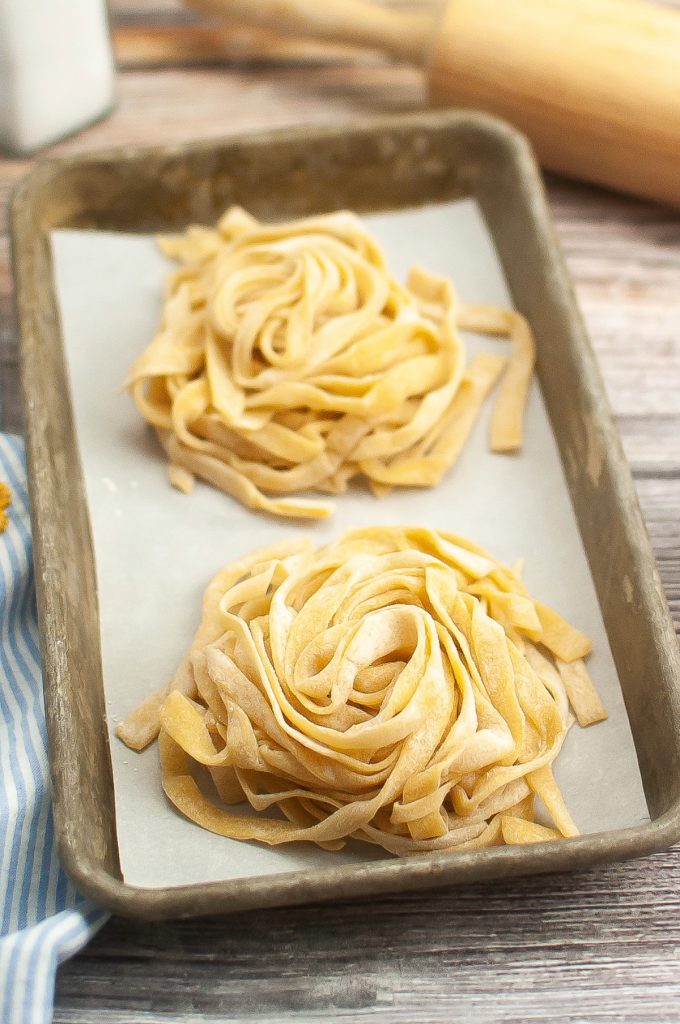
Table of Contents
Why You’ll Love This Recipe
- It’s easy to make. All you need is a few simple ingredients and some elbow grease!
- Homemade pasta has a great flavor that just can’t be beat.
- If you don’t eat pasta often, then this is going to be an incredible treat! You’ll never buy dry pre-packaged pasta again!
- The finished product looks impressive, even if you’re not a master chef! So impress your friends and family with this delicious homemade pasta recipe.
Ingredients Needed
You only need a few basic pantry staples and some time to help you make this homemade pasta dough. This is a quick overview of the ingredients, you can find the full recipe in the recipe card at the bottom of the post.
- fine Italian flour or all-purpose flour – Italian flour is finely ground. You will see is called double zero, doppio zero or 00 flour. This flour gives you tender chewy pasta.
- large eggs
- salt
- olive oil
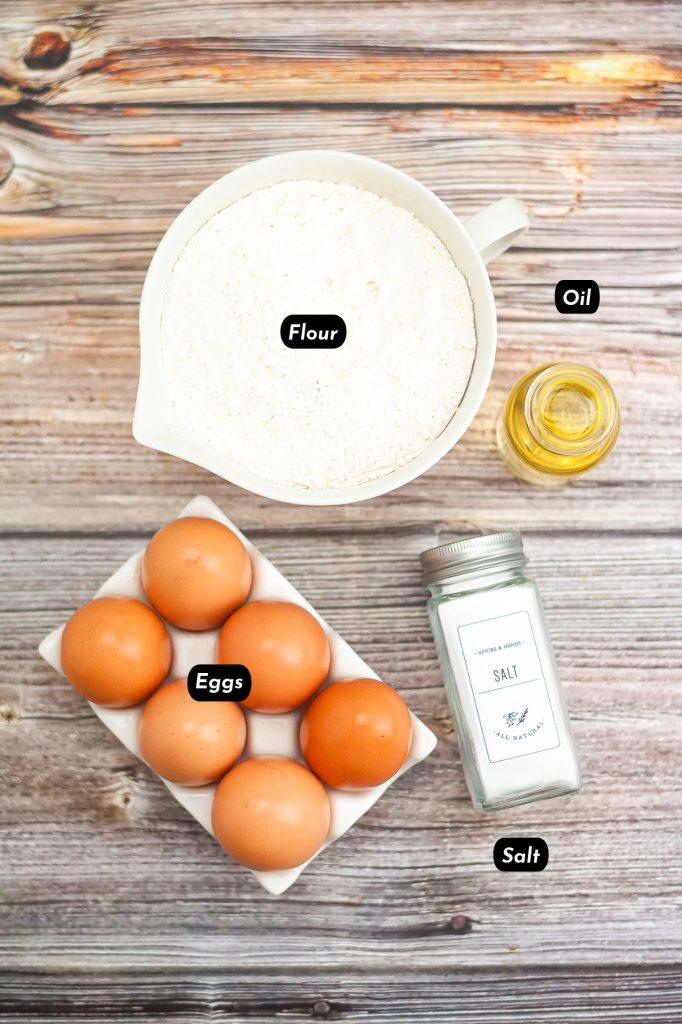
How to Make This Homemade Pasta Recipe
Making this basic pasta dough is so simple. Just follow the step-by-step instructions here or in the recipe card at the bottom of the post and you will have delicious pasta for your family meal in no time.
Step 1: Make a well in your flour and add in the remaining ingredients.
Place 2 1/4 cups of flour on a smooth, clean work surface (marble pastry board or flat counter space). Create a well in the center of the flour, making it about 4 inches wide. Add the cracked eggs, olive oil, and salt to the well.
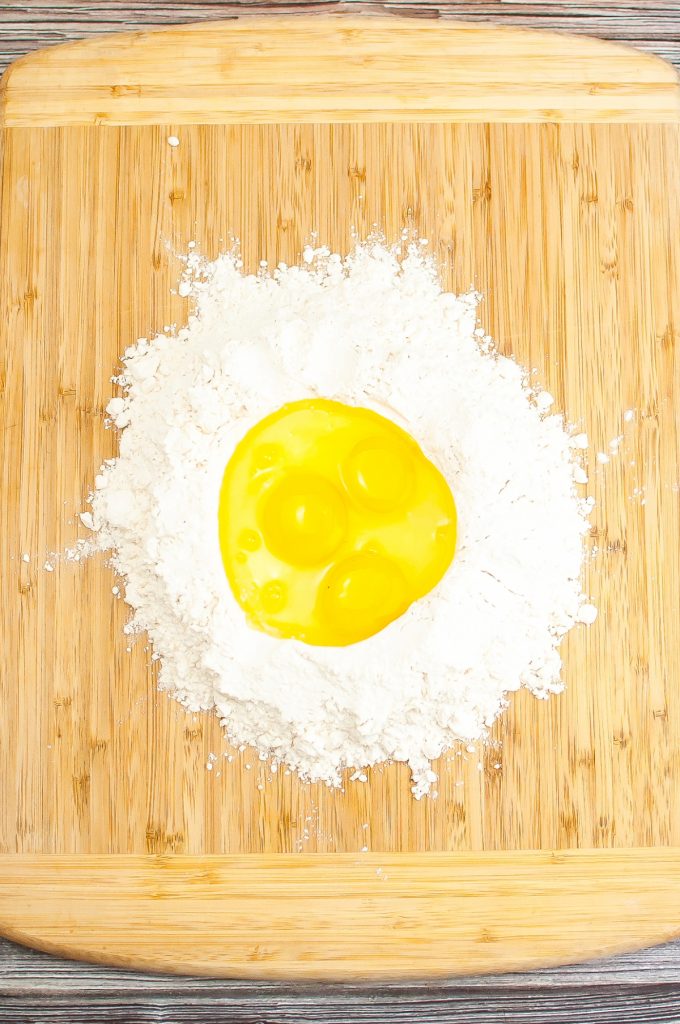
Step 2: Add the wet ingredients to make a dough.
Begin beating the egg mixture with a fork, gradually incorporating the flour from the sides. Keep mixing gently to avoid breaking the well. As you continue to mix, the flour will thicken the egg mixture, forming a shaggy dough.
Step 3: Finish the homemade dough.
Fold the mixture together using a bench scraper, fork, or your hands until a shaggy dough ball forms. Knead the dough by hand for about 10 to 15 minutes until it becomes smooth and elastic. If the dough is sticky, add 1 tablespoon of the remaining ¼ cup of extra flour at a time during kneading. Initially, the dough may seem dry and crumbly, but it should become smooth and slightly tacky.
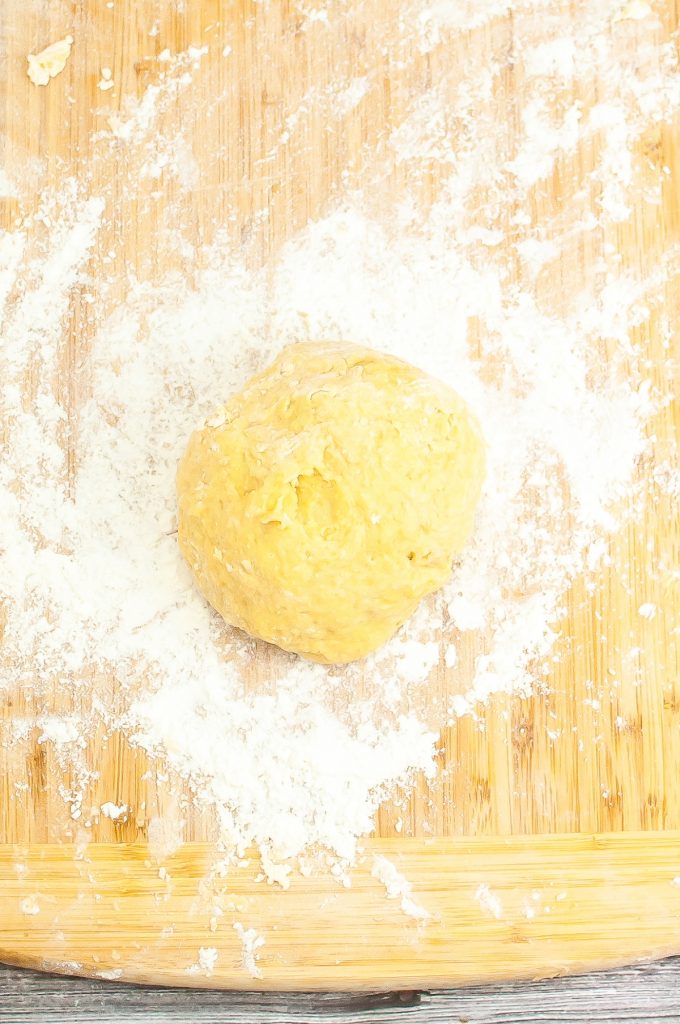
Step 4: Rest the dough.
Shape the dough into a ball and tightly wrap it in plastic wrap. Allow the dough to rest at room temperature for at least 30 min or up to 3 hours. Alternatively, you can refrigerate the dough for up to 24 hours. Before rolling, bring the dough to room temperature.
Step 5: Roll out the pasta.
Lightly dust a flat surface with flour. Divide the pasta dough into 2 to 4 equal pieces and loosely cover each piece with plastic wrap. Take one piece at a time and roll it into a ¼-inch thick rectangle on the floured surface. Sprinkle it with flour. Repeat with the rest of the dough.
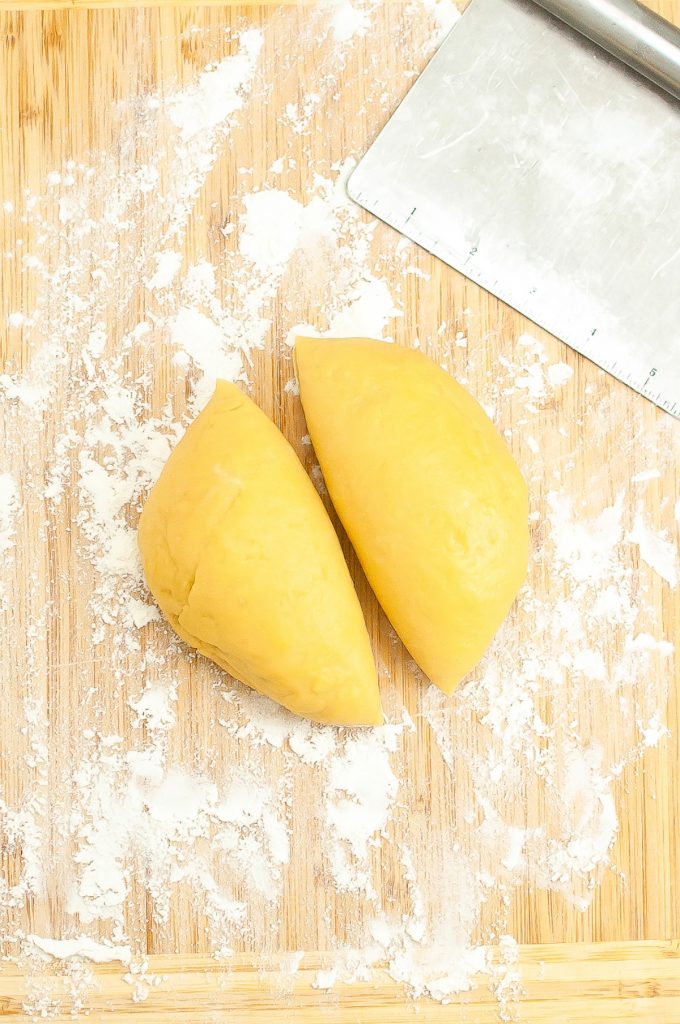
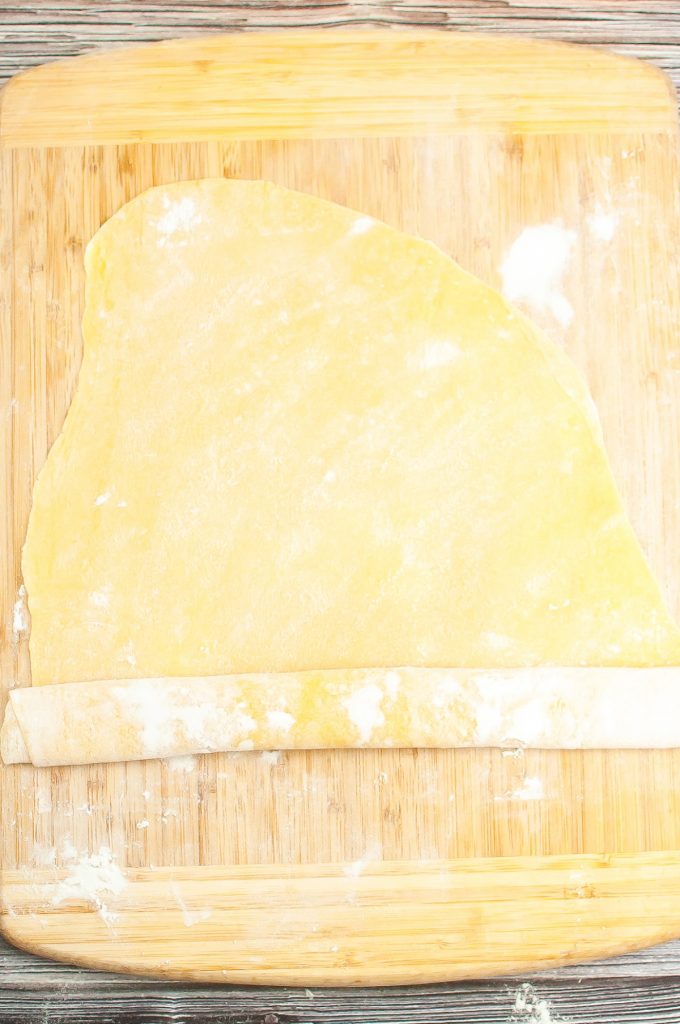
Step 6: Cut out the pasta.
Fold each pasta sheet into 1” to 3” folds, then cut each pasta sheet into 1/8-inch sections. Once cut, unravel each section for your noodles. Place in nests.
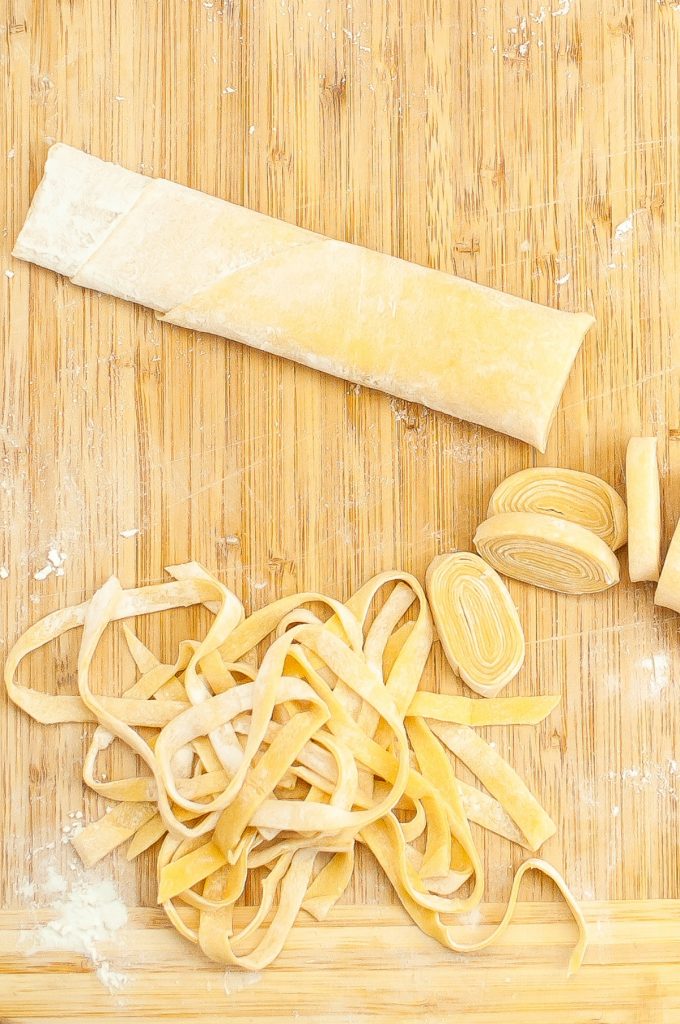
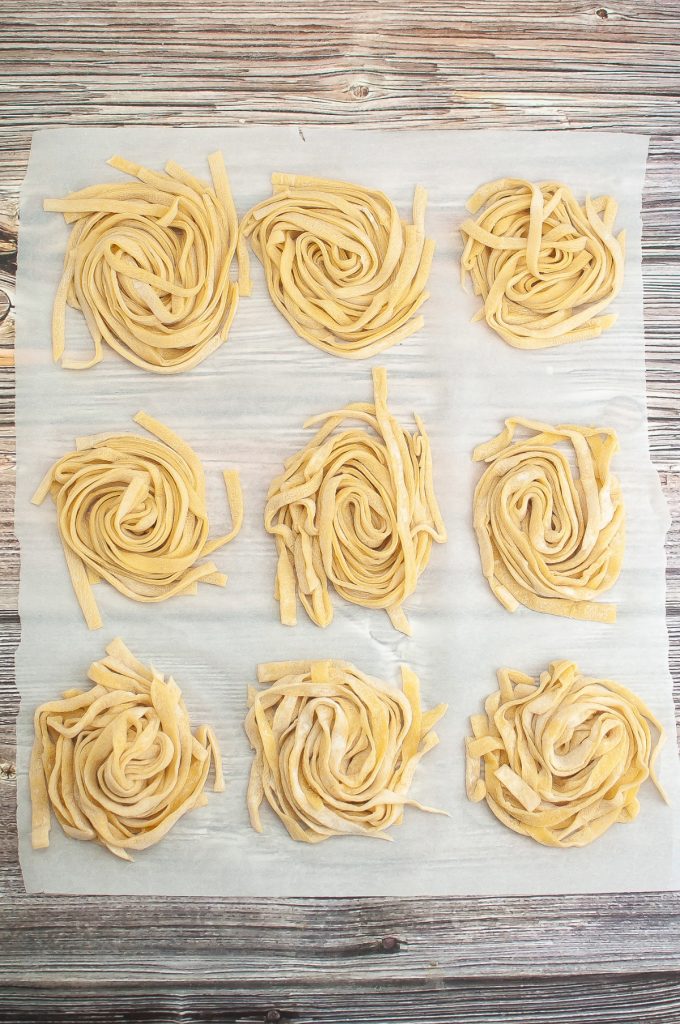
Step 7: Cook the pasta.
To cook the pasta, boil a large pot of salted water and drop it into it. Stir occasionally and cook until the pasta is tender, which usually takes around 3 to 5 minutes depending on the shape and size of the pasta.
Substitutions and Additions
- You can also make eggless pasta dough by substituting aquafaba (the liquid from cooked chickpeas) instead of eggs.
- For extra flavor add some seasonings to your pasta dough or sprinkle some fresh herbs or garlic powder.
- Feel free to experiment with using different flours to make your pasta. Try using semolina flour or whole wheat flour.
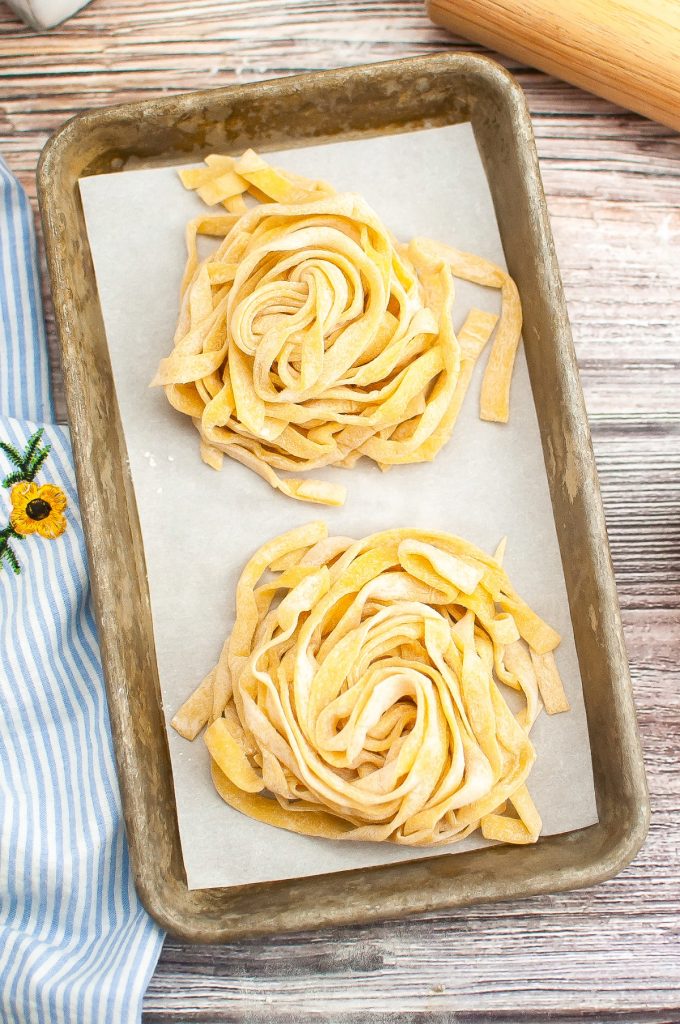
Storage
Storage: Uncooked pasta can be stored in an airtight container in the fridge for up to 24 hours.
Freezing: Fresh pasta dough can be frozen. To freeze it: form it into small mounds on a parchment paper-lined baking sheet and freeze until solid, then store it in an airtight container in the freezer for up to 1 month. Cook the frozen pasta directly without defrosting.
Serve Suggestions
I love to serve this fresh pasta recipe with a homemade sauce, some of my favorite sauce recipes are Basil Pesto with Walnuts, Meat Sauce, Keto Alfredo Sauce, or Meaty Crock Pot Pasta Sauce. Feel free to get creative with the sauces that you use.
You can also use this pasta when preparing this Copycat Olive Garden Steak Gorgonzola Alfredo Recipe.
Sandra’s Pro Tips
- If you don’t have a pasta cutter or pasta machine, you can use a sharp knife or a pizza cutter to cut your pasta dough.
- Using the flat of your hand to form the dough will help make sure it’s an even thickness throughout.
- Be sure to lightly dust your work surface with flour while cutting and rolling the pasta too!
- Keep in mind when cooking your pasta that different pasta shapes will have different cooking times. Test your pasta to ensure the perfect al dente.
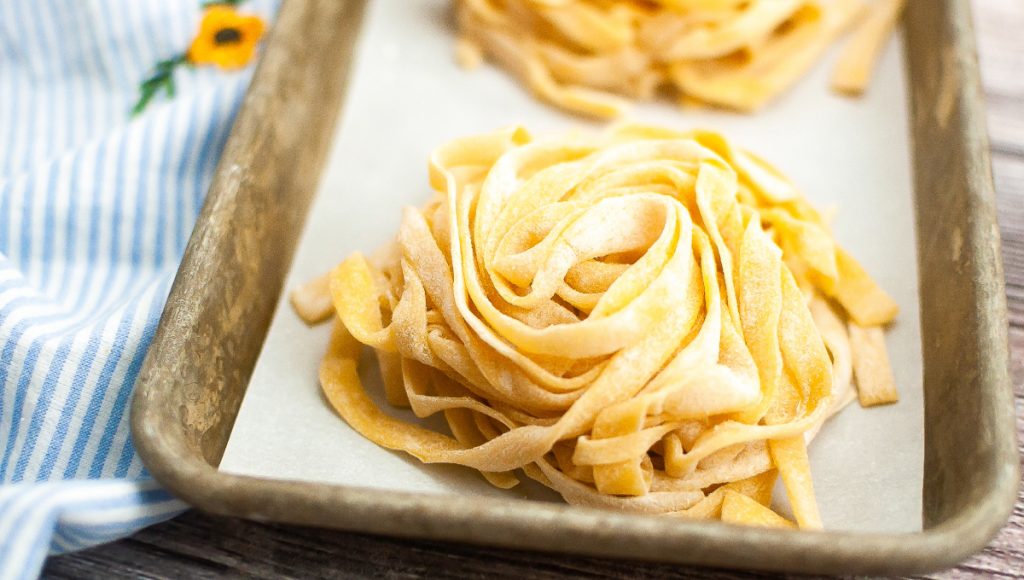
FAQs
Do you have questions about this delicious recipe? Here are the answers to the most commonly asked questions for this recipe:
Italian flour is a type of semolina flour that typically has a higher protein content than all-purpose flour. As a result, it produces pasta that is more dense and chewy.
Drying the pasta will help it hold its shape, so I recommend drying it over a drying rack for a short amount of time before cooking it.
Fresh pasta stored in the fridge can turn when it starts to absorb water. This is just the process of oxidation and doesn’t mean that it’s bad.
More Pasta Recipes You May Enjoy:
- Fettuccine Alfredo with Ham and Peas
- Bucatini pasta with sausage and kale
- Italian Sausage and Rigatoni
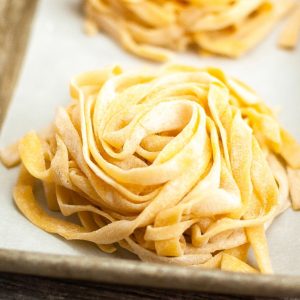
Homemade Pasta Recipe
Equipment
- bench scraper optional, but so nice to have!
- fork
- Plastic wrap
- Rolling Pin
- sharp knife or pasta cutter
Ingredients
- 2 1/2 cups flour Double zero or all-purpose
- 3 large eggs
- 1/2 teaspoon salt
- 1 tablespoons olive oil
Instructions
- Place 2 1/4 cups of flour on a smooth, clean work surface. Create a well in the center making it about 4 inches wide. Add the cracked eggs, olive oil, and salt to the center of the well.
- Begin beating the egg mixture with a fork, gradually incorporating the flour from the sides. Keep mixing gently to avoid breaking the well. As you continue to mix, the flour will thicken the egg mixture, forming a shaggy dough.
- Fold the mixture together using a bench scraper or your hands until a shaggy dough ball forms. Knead the dough by hand for about 10 to 15 minutes until it becomes smooth and elastic. If the dough feels sticky, add 1 tablespoon of the remaining ¼ cup of flour at a time during kneading. Initially, the dough may seem dry and crumbly, but it should become smooth and slightly tacky.
- Shape the dough into a ball and tightly wrap it in plastic wrap. Allow the dough to rest at room temperature for at least 30 min or up to 3 hours. You can also refrigerate the dough for up to 24 hours. Be sure to bring the dough to room temperature before rolling.
- Lightly add flour to a flat surface. Divide the rested pasta dough into 2 to 4 equal pieces and loosely cover each piece with plastic wrap. Take one piece at a time and roll it into a ¼-inch thick rectangle. Sprinkle it with flour.
- Fold each pasta sheet into 1” to 3” folds, then cut each pasta sheet into 1/8-inch sections. Once cut, unravel each section for your noodles.
- To cook the pasta, boil a large pot of salted water and drop it into it. Gently stir with a pasta fork and cook until the pasta is chewy and tender, 3 to 5 minutes.
Notes
Freezing Uncooked Pasta
To freeze uncooked fresh pasta, form it into small mounds on a parchment paper-lined baking sheet and freeze until solid, then store it in an airtight container in the freezer for up to 1 month. Cook the frozen pasta directly without defrosting adding 1-2 minutes to the cooking time.Using a Pasta Machine
To prepare fresh pasta using a pasta machine, you will need to use the roller and cutter attachments. After preparing the dough, cut the dough into small pieces and flatten the dough with your hands and roll through the thickest setting. Repeat and adjust the setting to thin the dough. Once you reach your desired thickness, place sheets of dough through the cutter attachment. See this KitchenAid video for details.Nutrition
Disclaimer
Please note that the nutritional information provided are guidelines and may vary based on the brand of products used. For your specific nutritional goals use My Fitness Pal or Verywell Fit recipe calculators. All content within this site is not intended as medical diagnosis or treatment and should not be considered a substitute for professional medical expertise.


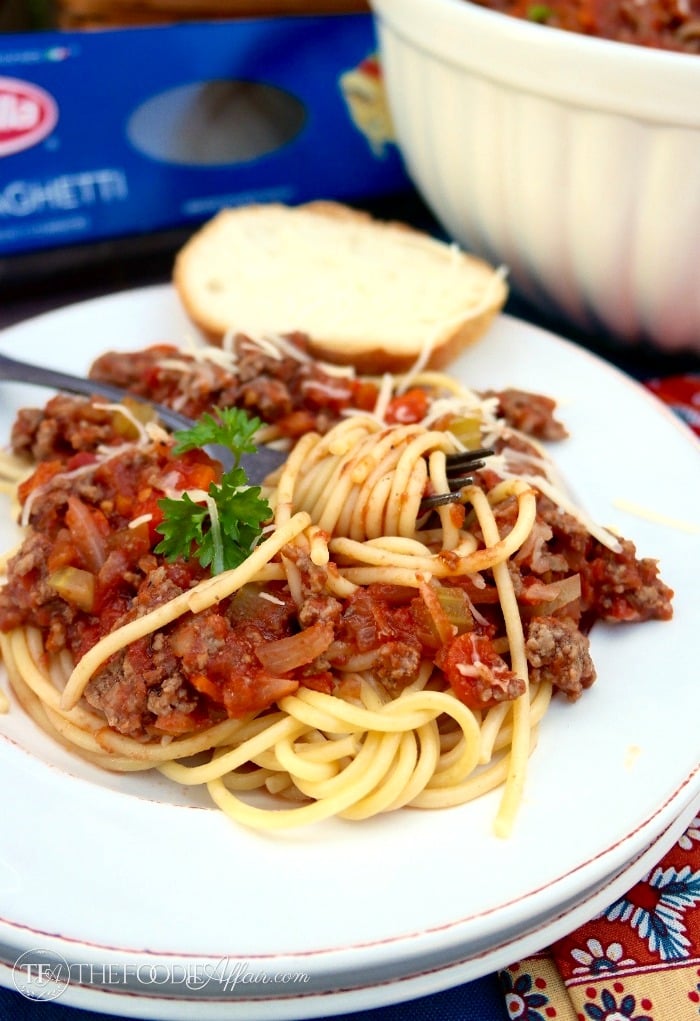
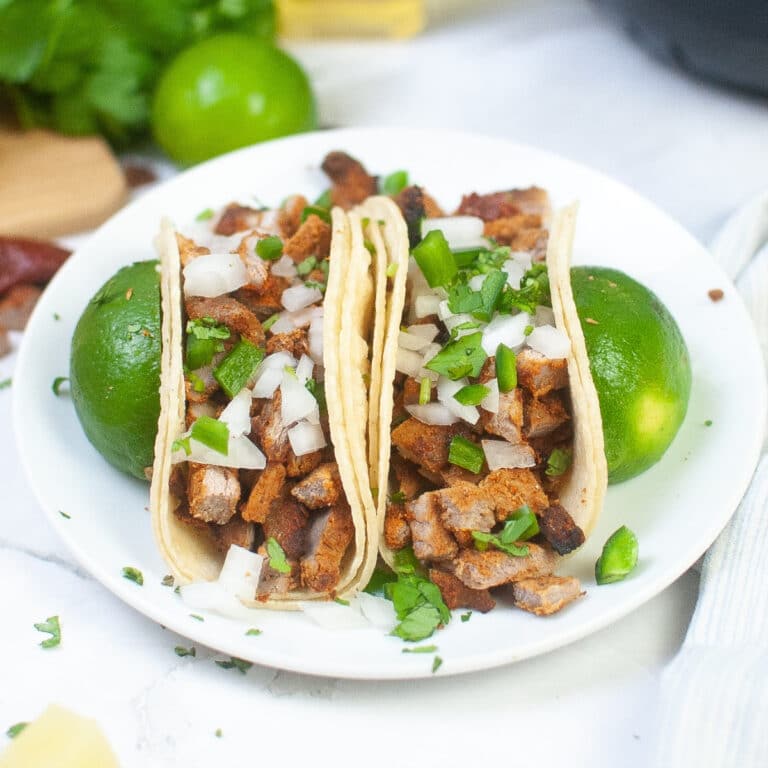
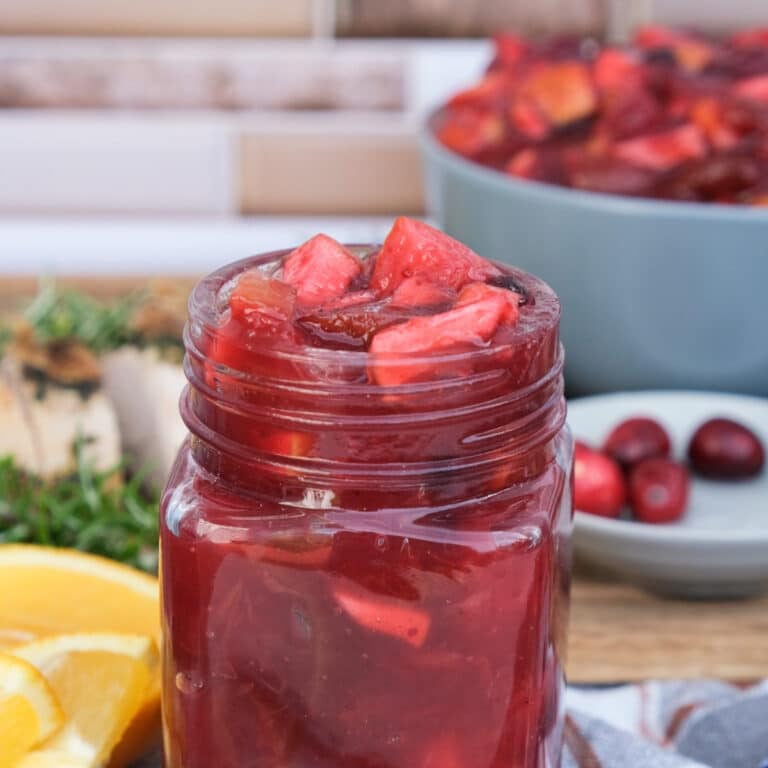
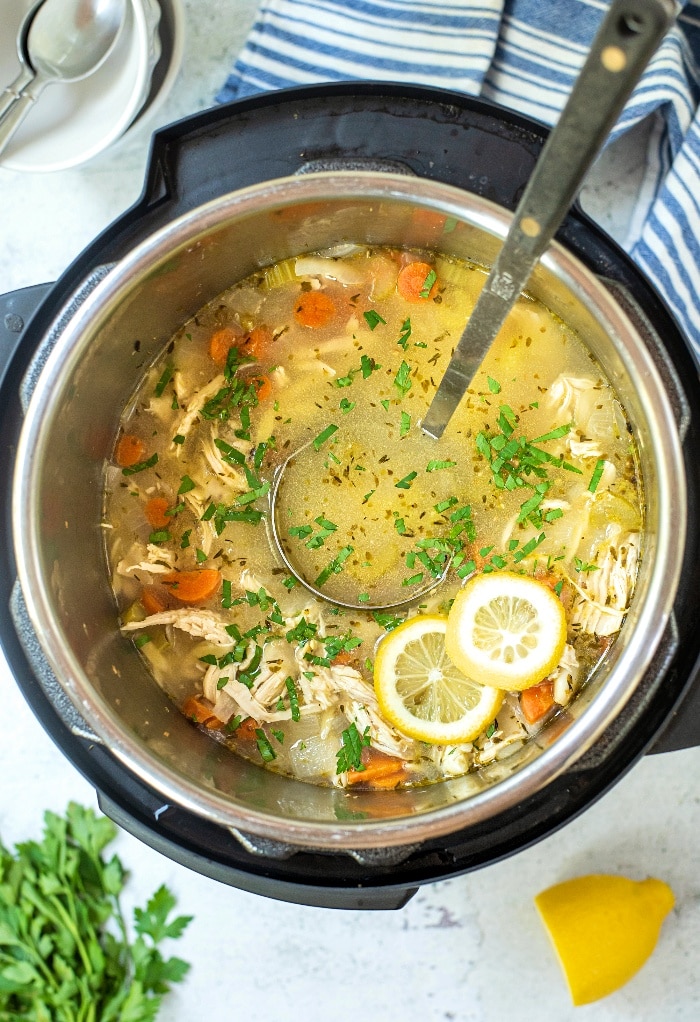
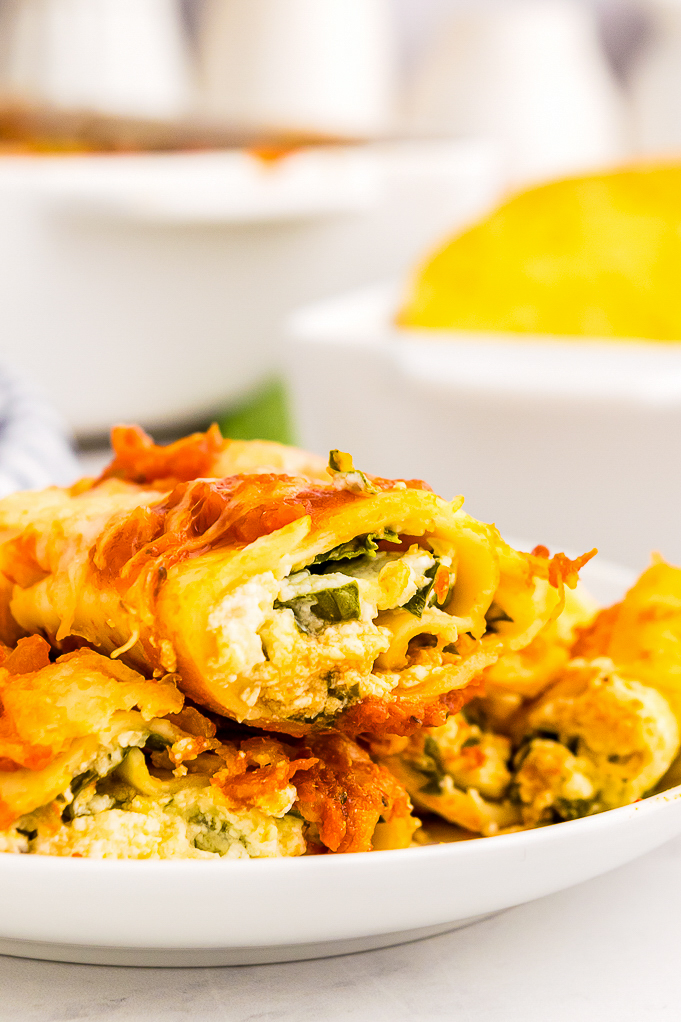
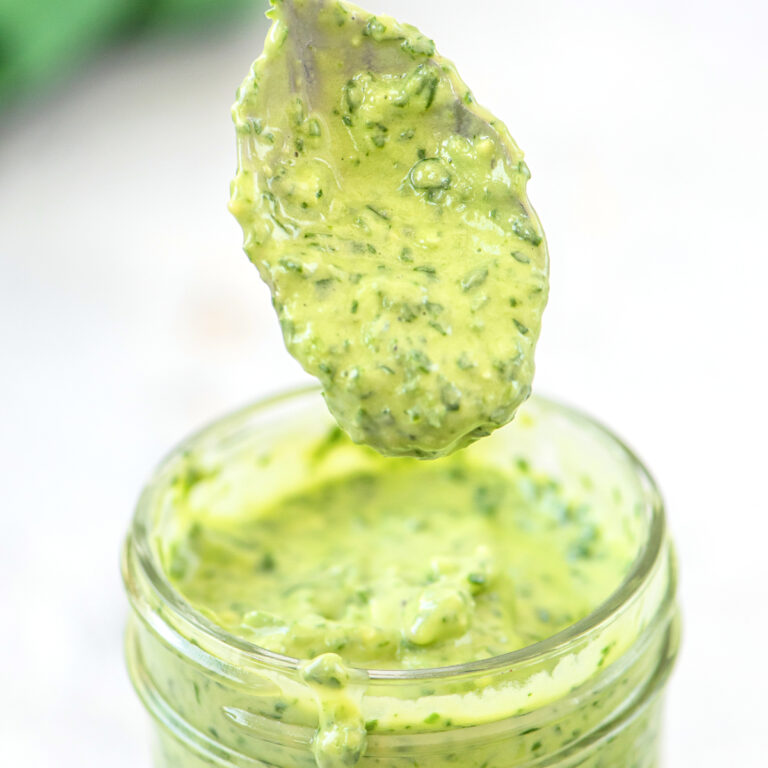
Your pasta looks beautifully done. I hope you and your family have a Merry Christmas.